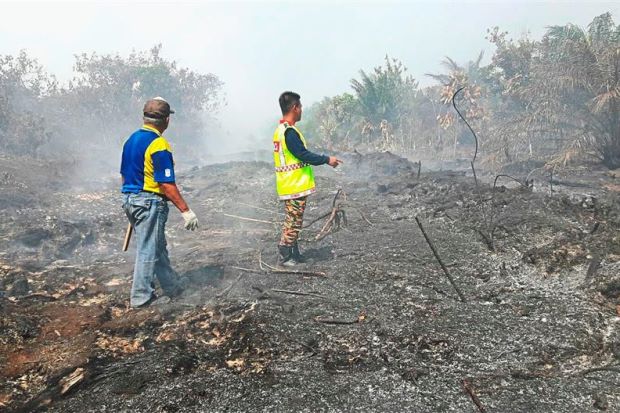
An oil palm plantation in Miri razed by forest fires. In Malaysia, peatlands have been utilised for agriculture, forestry and conservation of water resources.
KUCHING: The Sarawak Oil Palm Plantation Owners Association (Soppoa) supports scientific studies for better understanding of oil palm cultivation on peat soil.
It welcomes the 15th International Peat Congress (IPC) 2016 to be held here from Aug 15 to 19 and looks forward to fruitful discussions on issues relating to sustainable management of global peatlands.
Organised by the Malaysian Peat Society in partnership with the International Peat Society (IPS), IPC 2016 is significant as it is the first time the congress is held in South-East Asia.
Themed “Peatlands in Harmony”, it will discuss issues related to responsible use of peatlands as well as conservation and preservation of their unique dynamics and biodiversity.
In Malaysia, peatlands have been utilised for agriculture, forestry and conservation of water resources as well as native customary reserve lands. Rice and pineapple were the major crops for peat areas at first, with oil palm being introduced in the late 1980s.
According to Soppoa, a number of scientific research projects are being undertaken in oil palm estates in Sarawak for a better understanding of the relationship between the crop and the land.
The studies are conducted by Malaysian Palm Oil Board (MPOB), which has developed its own standard operating procedures for oil palm cultivation on peat soil, in line with the principles of IPS.
Another major institution conducting research into peat is the Tropical Peat Research Laboratory in Sarawak which seeks to produce scientific data for more comprehensive understanding of peat.
“These scientific activities will be very useful to the IPS community as new knowledge will be made available to everyone for better understanding of tropical peat which, until today is not well understood by the scientific community,” Soppoa said in a statement.
It said IPC 2016 would be an excellent platform for the global community to have a more informed understanding of tropical peat from the papers deliberated at the congress.
“This is mostly new knowledges which was recently gathered from scientific research activities conducted in a number of Soppoa members’ estates.
“With such facts and findings, the global peat community will gain further insights into tropical peat utilisation which will add to better understanding and policy formulation of peat resources globally,” Soppoa added.
Taken from The Star